"Sorrows of Werther" is a satirical poem by William Makepeace Thackeray written in response to the enormous success of Johann Wolfgang von Goethe's novel The Sorrows of Young Werther .
"Sorrows of Werther" is a satirical poem by William Makepeace Thackeray written in response to the enormous success of Johann Wolfgang von Goethe's novel The Sorrows of Young Werther .
Werther had a love for Charlotte
Such as words could never utter;
Would you know how first he met her?
She was cutting bread and butter.
Charlotte was a married lady,
And a moral man was Werther,
And, for all the wealth of Indies,
Would do nothing for to hurt her.
So he sighed and pined and ogled,
And his passion boiled and bubbled,
Till he blew his silly brains out,
And no more was by it troubled.
Charlotte, having seen his body
Borne before her on a shutter,
Like a well-conducted person,
Went on cutting bread and butter.— William Makepeace Thackeray, "Sorrows of Werther"

William Makepeace Thackeray was a British novelist, author and illustrator. He is known for his satirical works, particularly his 1848 novel Vanity Fair, a panoramic portrait of British society, and the 1844 novel The Luck of Barry Lyndon, which was adapted for a 1975 film by Stanley Kubrick.

Vanity Fair is an English novel by William Makepeace Thackeray, which follows the lives of Becky Sharp and Amelia Sedley amid their friends and families during and after the Napoleonic Wars. It was first published as a 19-volume monthly serial from 1847 to 1848, carrying the subtitle Pen and Pencil Sketches of English Society, which reflects both its satirisation of early 19th-century British society and the many illustrations drawn by Thackeray to accompany the text. It was published as a single volume in 1848 with the subtitle A Novel without a Hero, reflecting Thackeray's interest in deconstructing his era's conventions regarding literary heroism. It is sometimes considered the "principal founder" of the Victorian domestic novel.
The Luck of Barry Lyndon is a picaresque novel by William Makepeace Thackeray, first published as a serial in Fraser's Magazine in 1844, about a member of the Irish gentry trying to become a member of the English aristocracy. Thackeray, who based the novel on the life and exploits of the Anglo-Irish rake and fortune-hunter Andrew Robinson Stoney, later reissued it under the title The Memoirs of Barry Lyndon, Esq. The novel is narrated by Lyndon himself, who functions as a quintessentially unreliable narrator.

The Sorrows of Young Werther is a 1774 epistolary novel by Johann Wolfgang Goethe, which appeared as a revised edition in 1787. It was one of the main novels in the Sturm und Drang period in German literature, and influenced the later Romantic movement. Goethe, aged 24 at the time, finished Werther in five and a half weeks of intensive writing in January to March 1774. It instantly placed him among the foremost international literary celebrities and was among the best known of his works.

Werther is an opera in four acts by Jules Massenet to a French libretto by Édouard Blau, Paul Milliet and Georges Hartmann. It is loosely based on Goethe's epistolary novel The Sorrows of Young Werther, which was based both on fact and on Goethe's own early life. Earlier examples of operas using the story were made by Kreutzer (1792) and Pucitta (1802).
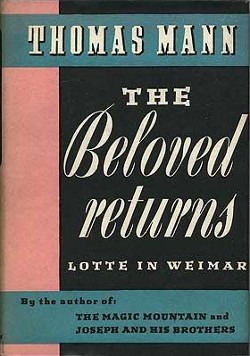
Lotte in Weimar: The Beloved Returns, otherwise known as Lotte in Weimar or The Beloved Returns, is a 1939 novel by Thomas Mann. It is a story written in the shadow of Johann Wolfgang von Goethe; Mann developed the narrative almost as a response to Goethe's novel The Sorrows of Young Werther, which is more than 150 years older than Lotte in Weimar. Lotte in Weimar was first published in English in 1940.
Sir Richmond Thackeray Willoughby Ritchie was a British civil servant. He spent most of his working life at the India Office, reaching the post of Permanent Under-Secretary of State for India.
Smith, Elder & Co., alternatively Smith, Elder, and Co. or Smith, Elder and Co. was a British publishing company which was most noted for the works it published in the 19th century. It was purchased by John Murray in the early 1900s, its archive now kept as part of the John Murray Archive at the National Library of Scotland in Edinburgh, Scotland.
Negus is a drink made of wine, often port, mixed with hot water, oranges or lemons, spices and sugar.
Catherine: A Story was the first full-length work of fiction produced by William Makepeace Thackeray. It first appeared in serialized instalments in Fraser's Magazine between May 1839 and February 1840, credited to "Ikey Solomons, Esq. Junior". Thackeray's original intention in writing it was to criticize the Newgate school of crime fiction, exemplified by Bulwer-Lytton and Harrison Ainsworth, whose works Thackeray felt glorified criminals. Thackeray even included Dickens in this criticism for his portrayal of the good-hearted streetwalker Nancy and the charming pickpocket, the Artful Dodger, in Oliver Twist.
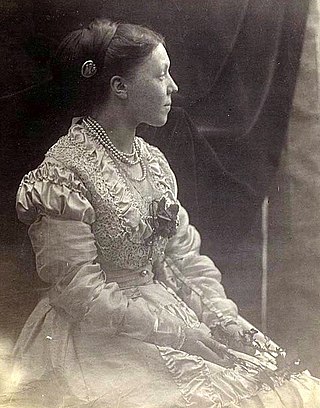
Anne Isabella, Lady Ritchie, eldest daughter of William Makepeace Thackeray, was an English writer, whose several novels were appreciated in their time and made her a central figure on the late Victorian literary scene. She is noted especially as the custodian of her father's literary legacy, and for short fiction that places fairy tale narratives in a Victorian milieu. Her 1885 novel Mrs. Dymond introduced into English the proverb, "Give a man a fish and you feed him for a day; teach a man to fish and you feed him for life."
The Newgate novels were novels published in England from the late 1820s until the 1840s that glamorised the lives of the criminals they portrayed. Most drew their inspiration from the Newgate Calendar, a biography of famous criminals published during the late 18th and early 19th centuries, and usually rearranged or embellished the original tale for melodramatic effect. The novels caused great controversy, and drew criticism in particular from the novelist William Makepeace Thackeray, who satirised them in several of his novels and attacked the authors openly.
Francis Thackeray (1793–1842) was a Church of England clergyman and author.
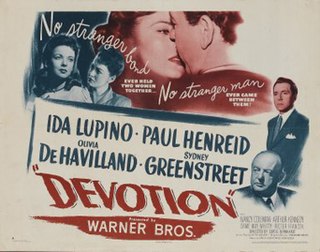
Devotion is a 1946 American biographical film directed by Curtis Bernhardt and starring Ida Lupino, Paul Henreid, Olivia de Havilland, and Sydney Greenstreet. Based on a story by Theodore Reeves, the film is a highly fictionalized account of the lives of the Brontë sisters. The movie features Montagu Love's last role; he died almost three years before the film's delayed release.
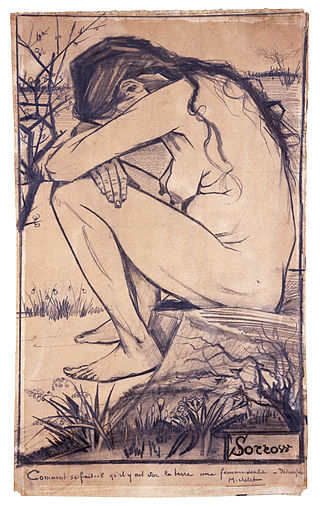
Sorrow is an emotion, feeling, or sentiment. Sorrow "is more 'intense' than sadness... it implies a long-term state". At the same time, "sorrow — but not unhappiness — suggests a degree of resignation... which lends sorrow its peculiar air of dignity".

The Adventures of Philip on his Way Through the World: Shewing Who Robbed Him, Who Helped Him, and Who Passed Him By (1861–62) is a novel by William Makepeace Thackeray. It was the last novel Thackeray completed, and harks back to several of his previous ones, involving as it does characters from A Shabby Genteel Story and being, like The Newcomes, narrated by the title character of his Pendennis. In recent years it has not found as much favour from either readers or critics as Thackeray's early novels.

William Ritchie (1817–1862) was an English barrister, Advocate-General of Bengal from 1855 to 1862.
Thomas Thackeray was a Church of England clergyman who taught at his old school, Eton College, and ended his career as Head Master of Harrow School. He received the degree of Doctor of Divinity (DD).
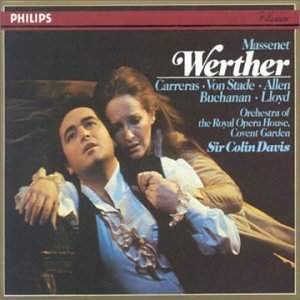
Werther is a 130-minute studio album of Jules Massenet's opera, performed by a cast led by José Carreras, Frederica von Stade, Sir Thomas Allen, Isobel Buchanan and Robert Lloyd with the orchestra of the Royal Opera House, Covent Garden under the direction of Sir Colin Davis. It was released in 1981.

Harriet Marian "Minny" Stephen, was the wife of Leslie Stephen and what her father William Makepeace Thackeray called 'the balance wheel in the family'.